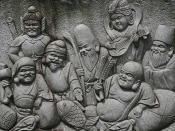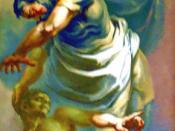in the late 17th and early 18th century a teacher from Trinity College in Dublin known as George Berkeley, whom eventually became a Anglican Bishop of Cloyne emerged out shadows to oppose John Locke's Theory of Human Knowledge. In which Berkeley denies Locke's theory and reduced the reality of the external world to the existence of finite spirits and the infinite spirit, God. He issues his theory of "Omne esse est percipi," or to be is to be perceived. This includes the entire world as we know it. For a tree to exist it must be seen. If one were to close their eyes that tree would not exist to them at that time. The one thing that Berkeley details is that the unperceived world by man is being perceived, and staying in existence, by God. In Berkeley's theory of Human Knowledge all things must be perceived to exist, with this how can God exist and keep the unperceived world existent? This mistake alone proves his theory wrong, it collapses with in it self.
If we can't see, smell, taste, hear or feel (perceive) God he can't exist and therefore one's unperceived world can't exist.
Berkeley's Theory of Human Knowledge begins with John Locke. Locke's object of human ideas were ideas or subjective impressions and not things. If ideas are the immediate object of our knowledge, is it ever possible to admit an external reality corresponds to such ideas? In Berkeley's Principles of Human Knowledge he denies
this theory and reduced the reality of the external world to the existence of finite spirits and the infinite spirit, God. For Berkeley, even Locke's concept of substance was merely a name insignificant of reality. Where Berkeley says there only is a world of spirits, dominated by God, the Supreme Spirit.
One of...


